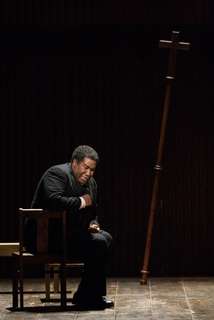|
Back
All hail Eric Owens! Albany
The Alice Busch Theater
07/22/2012 - & July 28*, August 3, 7, 11, 16, 18, 20, 25, 2012
Kurt Weill: Lost in the Stars
Eric Owens (Stephen Kumalo), Sean Panikkar (The Leader), Bongiwe Nakani (Answerer), Ernestine Jackson (Grace Kumalo), Ryan McConnell (Arthur Jarvis), Wynn Harmon (James Jarvis), Amos Nomnabo (John Kumalo), Makudupanyane Senaoana (Absalom), Chrystal E. Williams (Linda), Brandy Lynn Hawkins (Irina), Chebet Too (Nita), Jake Gardner (The Judge), Caleb McLaughlin (Alex)
The Glimmerglass Festival Chorus, David Moody (Chorus Master), The Glimmerglass Festival Orchestra and Chorus, John DeMain (Conductor)
Tazewell Thompson (Director), Michael Mitchell (Sets and Costumes), Robert Wierzel (Lighting), Anthony Salatino (Choreographer)

E. Owens (© William M. Brown)
It’s hard to believe that there was a period when Broadway audiences turned out for downright serious musical fare in a genre that seems to be becoming known as Broadway opera. Gian Carlo Menotti’s The Consul (of 1950), presented at Glimmerglass in 2009, is one example, as is Kurt Weill’s “musical tragedy” Lost in the Stars, first performed in 1949, just months before the composer’s death.
Those expecting the spiky, sardonic style of Weill's lanmark 1920s works can be disappointed by the sincere, even solemn, style of this piece, but the approach is entirely in keeping with the content.
The work is based on Alan Paton’s novel Cry the Beloved Country (and was produced soon after the publication of the novel thanks to the fact that Weill and his librettist, Sherwood Anderson, had access to the nmanuscript prior to its publication). It is set in racially-divided South Africa and recounts the tragic story of a black village priest who goes to the city to find his son, Absalom, only to find that he has been involved in a burglary during which he killed a white man. Ironically, the man he has killed (Arthur Jarvis) was anti-apartheid, unlike his bigoted father, James. The priest’s son is executed; the final scene shows a reconciliation between the father of the murderer and the father of the victim.
Tazewell Thompson’s production, with Michael Mitchell’s gritty, adaptable design and Robert Wierzel’s subtle lighting, is a marvel, bringing forth just right overall atmosphere plus telling detail. The moment of the murder (a stupid blunder more than anything), for example, is instantly replayed. (Mr. Thompson also brought out all the best in Copland’s The Tender Land two seasons ago.) However it is the absolutely commanding performance of Eric Owens in the central role of Stephen Kumalo, an unassuming man plunged into an agonizing tragedy, that makes the production an absolute must-see.
Other roles are strongly cast as well. Notable is Sean Panikkar as The Leader - namely the leader of the commenting Greek chorus (much like the character Che in Evita). Another strong presence is South African baritone Amos Nomnabo as John Kumalo, the priest’s angry, cynical brother. This production gives him a song “Little Tin God” that was cut from the original Broadway run. (Another once omitted number, “Gold” is sung by Absalom’s friends as they try to convince him to participate in the burglary.)
There are strongly performed female roles as well. Chrystal E. Williams livens the production with the entendre-laden “Who’ll buy?”, while Bongiwe Nakani as the Answerer, and Brandy Lynn Hawkins as Irina, Absalom’s fiancé, also deliver memorable vignettes.
Makudupanyane Senaoana is perfect as the hapless Absalom - who, by the way, displays integrity by confessing his crime when lying would have got off scot free.
The work is a co-production with Cape Town Opera. The presence of six performers from that company has surely helped with, for example, the authenticity of the South African accents used throughout.
There is a lot of spoken dialogue and I rather wished it had been tightened up. It is definitely a musical play - i.e., a play with interpolated musical numbers. The one widely-known song, “Lost in the Stars”, actually predates the stage work; its tone is philosophical and resigned when something more despairing might well be expected. The justification for actors bursting into song is that it occurs when emotions become too intense for mere words. The work fails in this respect in that the final searing scene, when the two grieving fathers meet, is all spoken.
Still, under the sure hand of John DeMain, and with in Thompson’s astute and eloquent staging, and with Eric Owens bearing the weight of the world on his shoulders, this production renders Lost in the Stars a gripping theatrical experience.
Michael Johnson
|